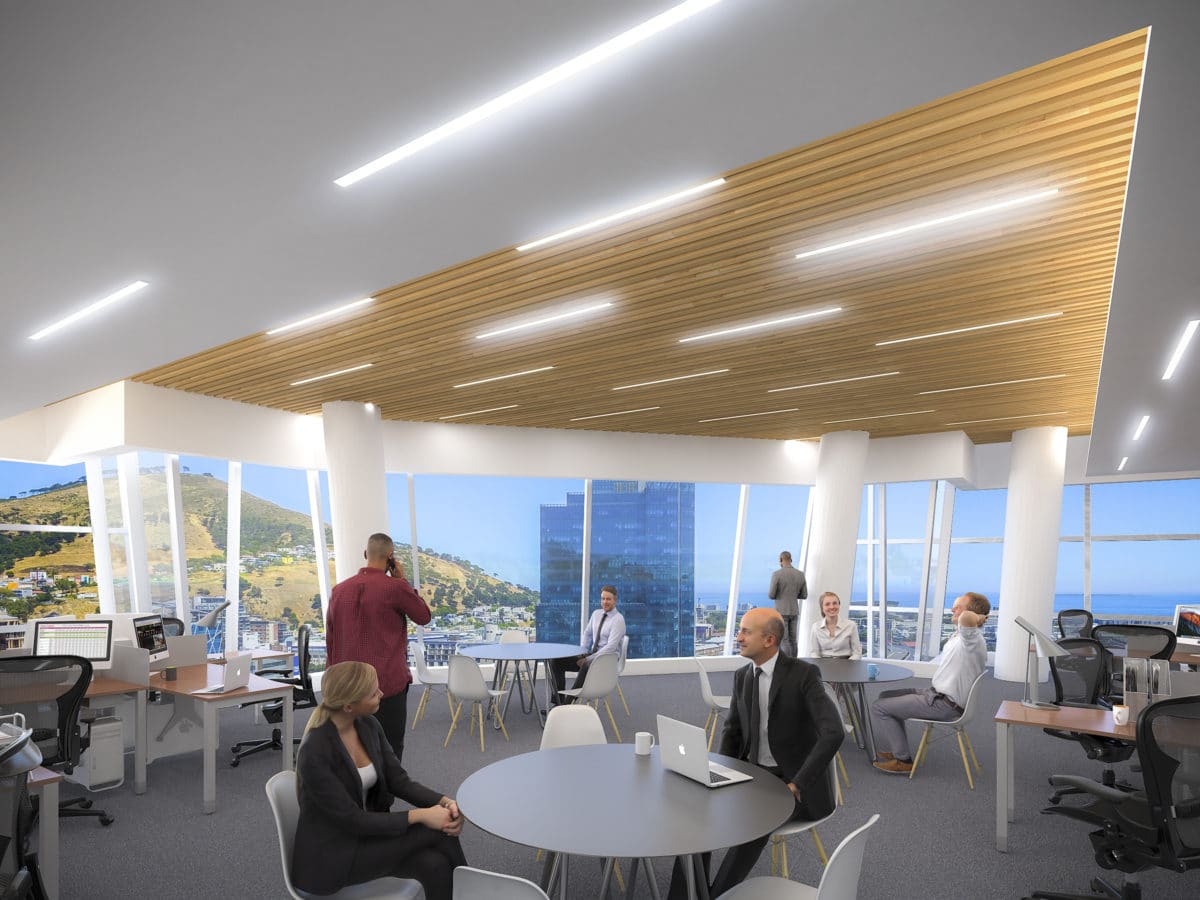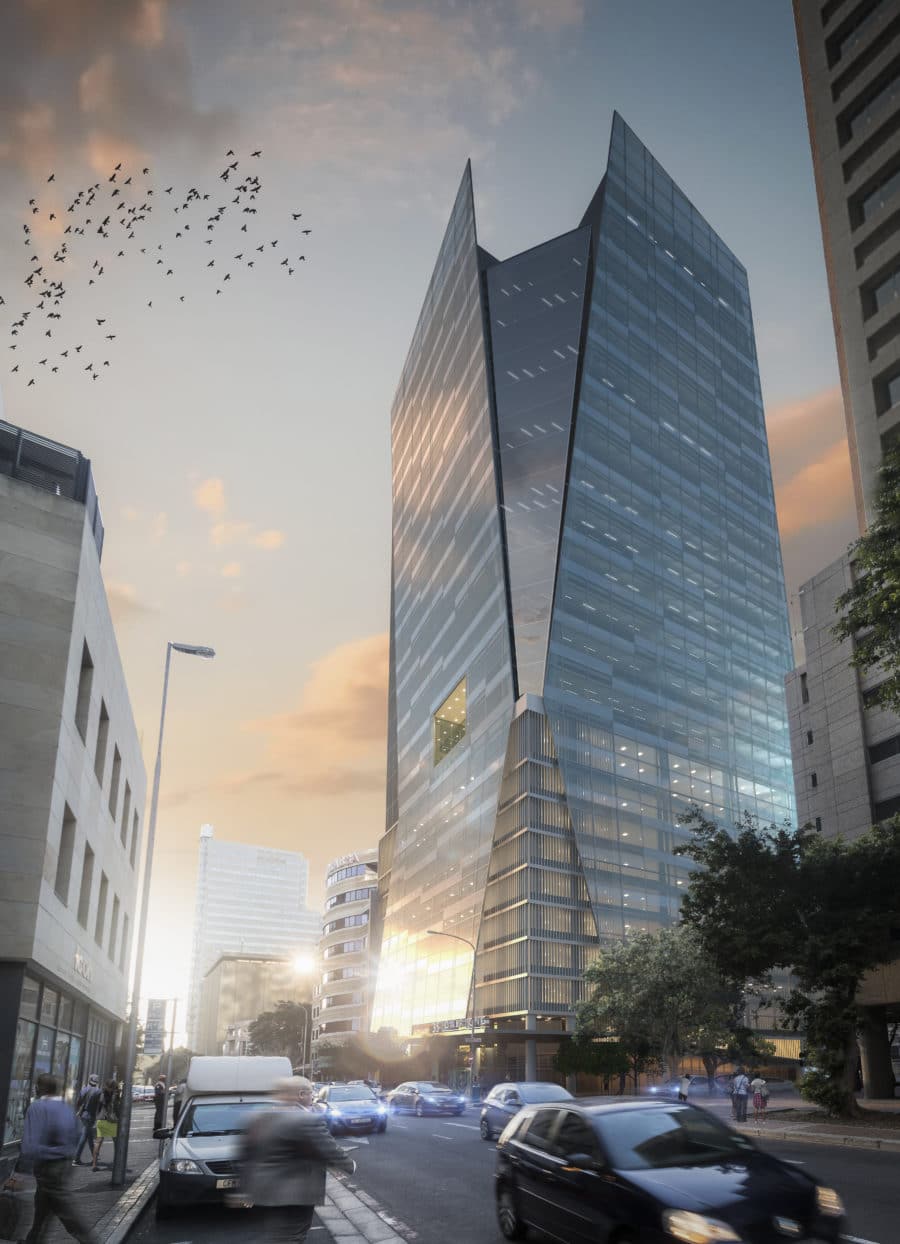
[Rendering: Courtesy of 35 Lower Long]
Sustainability was a top priority for 35 Lower Long, a high-tech office tower.
For South African property developer Abland, the benefits of going green are twofold. Buildings that reduce waste and consumption and are built with the future in mind not only benefit the environment but also the bottom line by reducing operating costs and attracting the best tenants.
That’s why, when Abland and joint venture partner Ellerine Brothers began development on a new office tower—35 Lower Long—in Cape Town’s Foreshore precinct, sustainability was a top priority, says James Cresswell, Abland’s regional director for Western Cape, South Africa.
It all started with putting together a list of priorities. “There are three issues that are critical for sustainable developments in the Cape Town CBD,” Cresswell says.
Reducing electrical and water consumption were the obvious places to focus, but Abland also added reducing vehicle trips to the list. While Cape Town has been hit with electrical and water shortages, traffic has become a major issue that negatively affects tourism and business. “The city as well as tenants have required developers to look at these issues to ensure new buildings do not exacerbate these problems.”
Next they needed to amass the right engineering team. With Aurecon on the structural side; Converge Consulting on electrical and lighting; Sutherland Engineers working on fire, wet services, facade, and lifts; Ekcon on mechanical; and green building consultants Green Direction keeping the project on track, development has already begun on the four-star green building, certified by the GBCSA (Green Building Council of South Africa), and completion is set for 2020.

The new building will have flexible office space, retail space, aboveground parking levels, a penthouse, and more. [Rendering: Courtesy of 35 Lower Long]
When the building finally makes its debut, it will encompass more than 144,000 square feet of flexible office space, 3,476 square feet of retail space, nine aboveground parking levels, and a penthouse on the top floor—all with high-speed internet connectivity. Its modern, glazed facade will have generous floor-to-ceiling heights and a sculptural form that will provide stunning views of the city.
But the project team’s innovative approach to Cape Town’s sustainability concerns will undoubtedly be the most impactful in the long-term. “The team identified the usual water and electrical saving devices such as energy-efficient devices and low-flow taps and then went further to identify the air-conditioning and lifts where the greatest water and electrical saving can be made,” Cresswell says.
To address this, the team introduced the sky lobby, a jockey lift system that could be used in conjunction with smart lifts. The team also incorporated the latest water-saving air-conditioning system. “The greatest saving on the air-conditioning was achieved by reducing heat buildup in the building,” Cresswell notes. “This was done by facing the building away from the harsh summer sun, changing the color and quality of the glass, as well as using a combination of double glazing and high-tech blinds.”
And what about reducing transportation congestion? It’s all in the location. The new building is convenient to both public transportation and bicycle lanes. Adding bicycle storage areas, showers, and lockers will encourage tenants to ditch their cars in favor of healthier, greener methods of commuting. Even the building’s construction keeps the focus on sustainability alive and well. With help from engineering consultancy Solid Green Consulting, waste from the site will be recycled and locally manufactured and sustainable products are used as much as possible.
Not only will occupants benefit from this high-tech green building, the community will for decades to come. From ensuring wind flows off the building don’t create a hazard for pedestrians to creating usable space for the community, Abland aims for 35 Lower Long to be more than just a pretty face. “We also wanted to ensure the building did not create dead facades that did not benefit passing pedestrians,” Cresswell says. “The building has double volume retail areas that open onto the surrounding pavements that will create an interactive space.”
Rather than simply a challenge, Abland approaches Cape Town’s sustainability issues as an opportunity to fulfill their mission to shape the South African landscape for the better. “Abland is proud of its developments and works very hard to ensure new buildings improve the overall location. We worked closely with the architects to ensure we developed a beautiful building that will benefit our future tenants as well as the citizens of Cape Town.”
